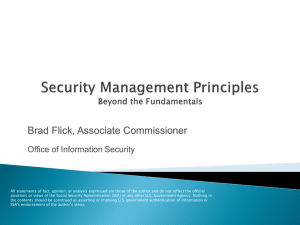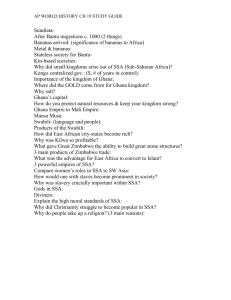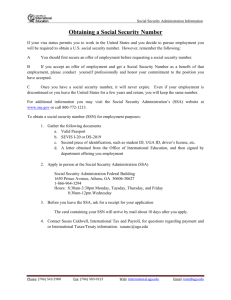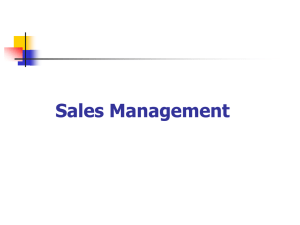Leveraging PMS Scorecards / Identified KPI
advertisement
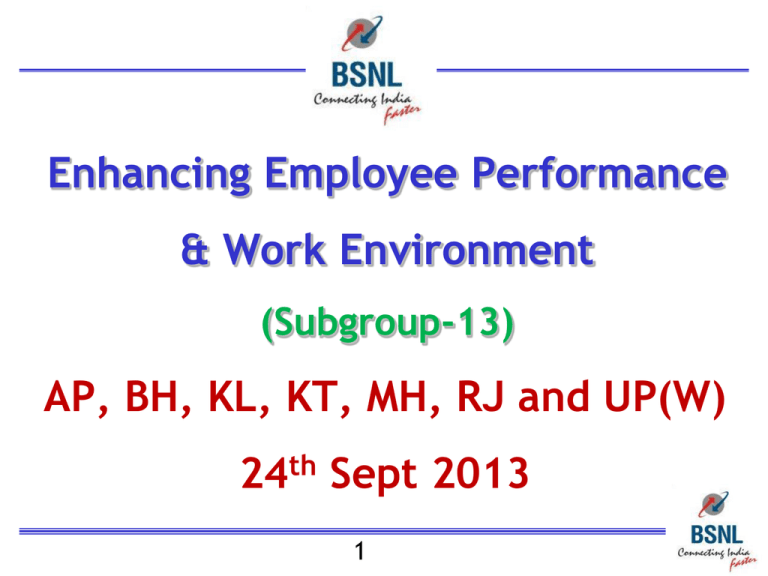
Enhancing Employee Performance & Work Environment (Subgroup-13) AP, BH, KL, KT, MH, RJ and UP(W) 24th Sept 2013 1 AGENDA 1) Introduction & Historical Perspective 2) Enhancing Work Environment 3) Motivating and developing loyalty to the Organisation 4) Building Team spirit 5) To inculcate owner ship of the assigned responsibilities 6) Improving Work ethics 7) How to develop and enforce accountability of employees 8) Leveraging PMS Scorecards/Identified KPI 9) Making staff management dialogue more productive and effective 2 VISION Be the leading Telecom Service Provider in India with Global presence Create a customer focused organisation with excellence in customer care, sales and marketing Leverage technology to provide affordable and innovative telecom. Services/Products across customer segments 3 MISSION Be the leading Telecom Service Provider in India with Global presence Create a customer focused organisation with excellence in customer care, sales and marketing Leverage technology to provide affordable and innovative Services/Products across customer segments Providing a conducive work environment with strong focus on performance Establishing efficient business processes enabled by IT 4 Introduction & Historical Perspective Vision & Mission of the Company to be clear to all Organisational Objective should be paramount Individual and Group Objectives should be subservient to the organisational objectives All employees should work in unison to improve revenue and market share 5 Introduction & Historical Perspective We have abundant work force with average age of around 50 BSNL is taking care of all Physiological & Psychological needs of its employees Most of the employees were originally recruited for Govt. Sector and are rule-oriented They need Training & Mentoring to change the mind set and to maintain productivity Customer Service and Customer bliss is the motto Profit orientation is the need of the hour 6 Enhancing Work Environment Ensuring work atmosphere infrastructure, hygiene, etc. Implementation & evaluation of KPIs in HR package ERP implementation 7 like proper seating, office Motivation and Developing Loyalty to the Organization Non-performers should be given an opportunity in different field to improve themselves There should be proper monitory and non-monitory incentive system for higher performance in each area of activities Fast track promotional avenues should be made available for talented and qualified employees 8 Motivation and Developing Loyalty to the Organization Scope for improvement in BSNL performance/prospects with motivated / loyal employees to be explained to all groups of Executives/Non-executives At present awards are being given at Circle level. This needs to be done at SSA level also, as it was done earlier. Best employee based on KPIs to be declared as “Employee of the Week (at SSA level) /Month (at Circle level) / Quarter (at Corporate Office level)” to be displayed prominently on all Notice Boards, CSCs, Exchanges and Offices 9 Motivation and Developing Loyalty to the Organization Certificates and appreciation letters for achieving goals Monetary rewards to encourage growth and performance Celebrate the success and recognition in public 10 Motivation and Developing Loyalty to the Organization Training, Incentive and awards always helps to recognise individuals, groups, SSAs and circles to motivate and develop loyalty to the organisations. The existing BSNL award / incentive scheme are quite insufficient. SSA and Circle should be able to recognise performers and give award Incentives (Bonus) scheme may be introduced employees belongs to profit making circles/ SSAs 11 to the Motivation and Developing Loyalty to the Organization Much exposure to employees on “SMART” working Profit making circle/SSA should have more relaxed delegated powers for procurement and spending money on essential heads. This will enable the Circle / SSA head to perform more effectively with higher output. They should be allowed more cash authorisations when compared with loss making circle “Employee Incentive Scheme” which is being followed in Kerala Circle is effective and is bringing good results. Under this scheme, employees are made into small groups through out the SSA and quantitative targets are assigned to these groups. Points are allotted for new connection provision in all Verticals and the Group which achieves maximum points will be given incentive Encourage creativity and ideas 12 Building Team Spirit Team spirit can develop, when The common purpose is clear beyond confusion Team players have well defined responsibilities Team players are ready to cater to the other member’s weaknesses on the fly Member’s efforts are channelized to the common purpose as per leader’s directions Without team spirit There is no urge towards the common purpose The goal and expectation of the team should be well defined and communicated properly 13 Building Team Spirit Performance of different responsibility groups to be compared to make poorly performing teams to improve Free flow of information and communication between team members. Communicate the expectation and the purpose of the team. Lectures of eminent personalities from academia and industry should be conducted periodically for imparting virtues of team spirit among all employees. Need to adopt to newer methods of Communication SMS E-mail Social Media Networking Conferencing 14 Building Team Spirit The aspiration and goal of the individual member should be respected and helped to align towards the organisational goal. Practicing simple courtesy for powerful relationship among the members Use powerful and positive language in interaction with others Inculcate the feeling that “together we achieve” Recognition, praise and credit for the contribution. Informal gatherings or platforms like Yahoo-Groups, etc. are to be exploited to inculcate oneness among the employees. 15 To Inculcate Ownership of Assigned Responsibilities Ownership improves, if assigned responsibilities Are clear and commensurate with capability and character of the person on the job Are able to motivate the person on the job 16 To Inculcate Ownership of Assigned Responsibilities Needs to be clearly and unambiguously defined Constant monitoring, supervision and guidance for advice for improvement will help Responsibilities assigned should be clear and should be quantified 17 To Inculcate Ownership of Assigned Responsibilities Delegate power of freedom to take decision. Appreciate the people who take responsibility. Periodic review of works. Awareness on their roles and target with respect to the larger interest of the organization. Friendly and considerate attitude to others. Suitable reward-and-punishment system should be implemented for better ownership of responsibilities 18 Improving Work Ethics Ethics is a personal quality and is more or less related to the personal integrity of the individual. Ethics are outcome of Sound understanding of company policies Knowledge of various processes Work Ethics can be improved by adequate creating a sense of belonging 19 training & by Improving Work Ethics Punctuality and adherence to the targets to be encouraged Adhering to the company’s policies & objectives. Maintaining quality and quantity of work Respect the contributions of other colleagues Enhancing work environment: 20 To Develop and Enforce Accountability of Employees Employees are to be categorized as Outstanding-performers, Good-Performers and under-performers. Good performers and Outstanding performers are to be identified and awarded. In case of underperformers an effort should be made to identify the areas where they can contribute and move them to those jobs. Time Bound promotions should be given only to performers and Over-performers should get their time bound promotions earlier. 21 To Develop and Enforce Accountability of Employees Duties and responsibilities of all staff to be well defined Irrelevant cadre to be restructured Specialisation is essential 22 Leveraging PMS Scorecards / Identified KPI 23 Leveraging PMS Scorecards / Identified KPI Right skill for Right job Availability of resources The results of scorecards need to be taken into account while writing APARs Performance to be correlated with the system performance which can be assessed through Software to monitor individual performance through systems like, CDR, NoC, PG Monitoring, BSNL Care portal, Leased Circuit Monitoring, Revenue, Fault, Provisioning, etc. 24 Leveraging PMS Scorecards / Identified KPI Various reports such as no. of activities performed at counters, payments received , login/logout timings of the counters etc. can be generated at the circle level for better and effective monitoring PMS to focus on only a few critical parameters keeping revenue as focus IPMS shall be the basis of consideration of an employee request Quarterly review of employee performance The key parameters shall be quantifiable and measurable 25 Leveraging PMS Scorecards / Identified KPI Each and every staff should have individual scorecard/fully quantify all the work they do without missing any item and weight-age assigned to each of the jobs they do The IPMS (Individual Performance Monitoring System- for administrative/office staff and officers)) & FPMS (Field Performance Monitoring System – for field staff/officers) to be made compulsory and made more effective for all staff up to Gr.D. This should be reviewed by controlling officers on a Quarterly basis. 26 Making Staff-Management Dialogue More Productive & effective Organizational focus to precede individual staff issues The policy for electing a single majority association of executives has to be implemented at the earliest Transfer/Postings to be based on performance and tenure All personal policies to be dovetailed to Organizational performance / prospects instead of being open ended looking to only individual requirements 27 Making Staff-Management Dialogue More Productive & effective Senior Officers to devote one day in a week to settle staff problems Works committee need to be introduced at the field level Procedure need to be made for work committee for proper implementation and monitoring should be done The work committee suggestions need to be seriously considered by the higher management and to be implemented which will motivate the members of the work committee There should be frequent and fair interaction with all section of the employee with the head of the unit 28 Making Staff-Management Dialogue More Productive & effective Innovative and creative idea should be invited from the employees on a regular basis and the best idea which results in operational efficiency improvement should be suitably rewarded Effective sharing of information with respective objectives and goals of the organization to the lowest level. Suggestions/feedback of the employees may be collected Provide channel for upward communication and listen to the employees opinion Solicit feedback and listen to the problems before it becomes difficult and costly to manage 29 Recommendations 1. VRS may be implemented to increase the productivity per employee 2. Promotion policy : following lines: EPP and NEPP requires review on the Minimum benchmark may be “Very Good” for up gradation of pay/promotion For SSA Cadre: Any second promotion shall be with station change For Circle Cadre: Any second promotion shall be with station change and third promotion shall be with change in SSA For All India Cadre: Any second promotion shall be with SSA change and third promotion will be with Circle change 30 Recommendations 3. Transfer Policy: Retention in the same discipline on transfer to gain expertise up to the level of DE For JAG & above, posting should be in different fields 4. Target Setting: CO should set targets in consultation with the CGM. Similarly, CGMs should fix targets to the units under him through mutual consultation. 5. Job description: Job description to be clear and unambiguous It should be both qualitative & quantitative across all units and employees 31 6. Exposure to employees on “SMART” working: This involves Categorisation: Customers, Pillars, Exchanges, BTS, etc. Differentiation: Fault rectification, Promotional Offers, Special discounts, Resource allocation, etc. Optimisation: Resources, Network and Support 32 Recommendations 7. Performance Management & Appraisal: Benchmarking of each post is to done and employees to be categorised into Outstanding Performer, Good Performer and Non-performer. The IPMS (Individual Performance Monitoring System- for administrative/office staff and officers)) & FPMS (Field Performance Monitoring System – for field staff/officers) to be made compulsory and made more effective for all staff up to Gr.D for writing APAR. 33 8. Incentives: A small % of net profit may be given as an incentive for the high performers. Profit making circle/SSA should have more relaxed delegated powers for procurement and spending money on essential heads. “Employee Incentive Scheme” which is being followed in Kerala Circle is effective and is bringing good results. Under this scheme, employees are made into small groups through out the SSA and quantitative targets are assigned to these groups. Points are allotted for new connection provision in all Verticals and the Group which achieves maximum points will be given incentive Best employee based on KPIs to be declared as “Employee of the Week (at SSA level) /Month (at Circle level) / Quarter (at Corporate Office level)” to be displayed prominently on all Notice Boards, CSCs, Exchanges and Offices 34 9. Works committee need to be introduced at the field level: Procedure need to be made for work committee for proper implementation and monitoring should be done The work committee suggestions need to be seriously considered by the higher management and to be implemented which will motivate the members of the work committee 35 Recommendations 10. Punctuality vs. Productivity ? Focus should be more on productivity than on punctuality in a competitive environment 36 Thank You 37 SIMPLE APPROACH Set expectation: Freely discuss with employees about the shortterm & long-term goal and Vision & Mission of BSNL. Also clearly tell them what are expected from them and how each & every employee is important in this process. Get their suggestions regarding how much and in what way we can contribute in this exercise. Refine their ideas and freeze the blue print in each & every employee-wise/ Subdivision-wise / Division-wise & SSA wise. Don’t direct but facilitate. Let there be no hand-holding or baby-sitting Invite Commitment: Discuss and make them understand how the goals for BSNL (short-term & long-term) will be beneficial to them first and then to the Company and to the country as a whole. Each & every employee should realize that since BSNL being Government Company, whatever they do is an opportunity given to them to show gratitude not only to the Company but to the Country as a whole. 38 SIMPLE APPROACH Measure progress: Performance with respect to the set goals is to be measured and it should be made clear how they contributed well. In the case of gaps, how it is affected the overall performance of the Sub Division/Division/SSA should also be made clear to all. It should be periodically viz. in Sub Divisional level – once in a month at least and once in a fortnight preferably Providing Feedback: Manager/Executive should send sincere feed back to support the employee to bring up their performance and for bringing them into main stream. The feed back should be not to appease them or to fix them and it should not be out of fear or favour. 39 SIMPLE APPROACH Link to consequences: Good work may be encouraged by congratulatory Email or open appreciation and shortcomings may also be clearly spelt in person and suitable measures may be taken so that they feel to pay for their shortcomings rather than punished. Evaluate effectiveness: At the end of the term (may be quarterly) Executives should measure the effectiveness of their approach in terms of: • • • • Whether it improved contributions and commitment in employees Whether it contributed to overall goal Whether it improved the efficiency and team working in employees. If not, he has to do necessary correction and re-introduce. 40
